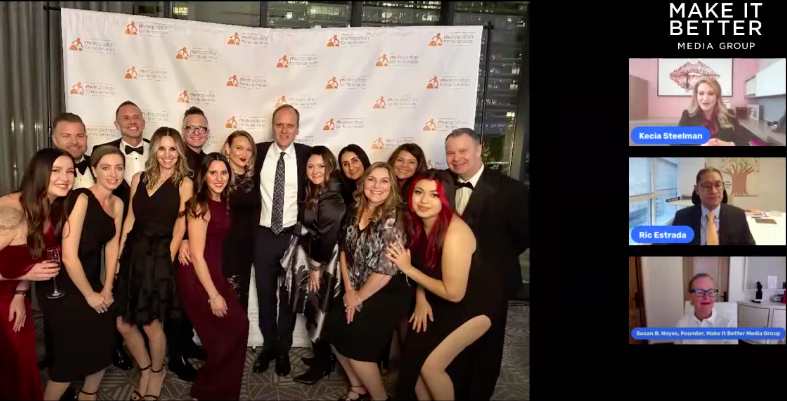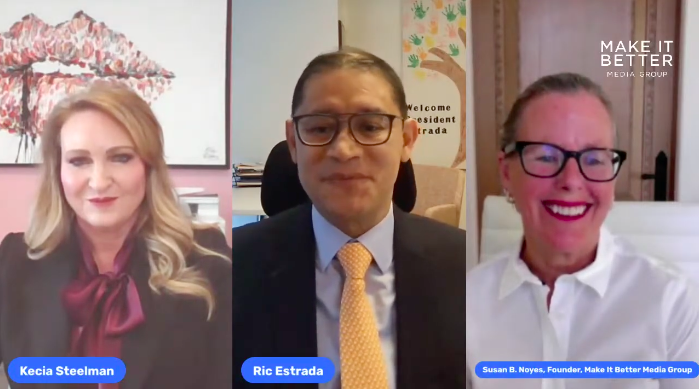Within Chicagoland is a network of organizations, businesses and nonprofits that all aspire to do good for the larger community. Partnerships between these institutions are imperative, but what’s the best way to foster and sustain them, maximizing impact for all? To answer this question and more, Make It Better Media Group hosted a virtual discussion on January 24, paneled by Ric Estrada, CEO of Metropolitan Family Services; Kecia Steelman, COO of Ulta Beauty; and moderated by Susan B. Noyes, Founder and Chief Visionary Officer of MIBMG.
What makes a great partnership between a nonprofit and a corporation?
“They have to be built on authentic relationships, and the desire to bring good to one another,” Estrada said. One organization shouldn’t tell the other what to do, rather the cohesive relationship should hinge on a shared respect, vision and passion. “If that happens, magic happens.”
From a corporate angle, Steelman recommends a four-tier approach:
- Sharing the passion and showing up, via dedication to the board, as one example — a concept Estrada seconded.
- Having the infrastructure to support the partnership, and recognizing that a leader needs a team to get the job done.
- Associate engagement is massively important to improve the relationship between leadership and those on the front lines
- Finally, innovation and “thinking differently” are key to continued success, especially after the slump of the pandemic.

Lead With Mission, Facilitate Engagement
Estrada and Steelman agreed that the best work is done when earnest engagement and a people-first mission collide — as it does at events like Metropolitan Family Services’ Mpower The Night, an annual celebration of success and community. “It’s not just about writing a check for a corporation, it’s about how can you get your teams engaged,” Steelman added.
Confidence Is Key
Additionally, the panel suggested that the partnership is only as healthy as the confidence and trust the respective organizations place in one another. That confidence leads to donating and supporting with pride and reassurance. That same trust placed in MFS helps inform their approach and transparency, which is holistic in its approach and helps individuals and families who are looking for assistance on a range of needs, from housing to employment and more.
“I’m here because I look, I was, I am the clients,” Estrada said, “and I care deeply about making sure that they have all of the opportunities [they should].”
View this post on Instagram
Prioritizing Diversity, Equity and Inclusion
For both organizations, working toward diversity, equity and inclusion goals is paramount. This results in a company-wide team that looks and shares the same experiences with the folks they serve. At Ulta, “visibility, opportunity, awareness and ability to shop for everyone,” particularly women- and BIPOC-owned brands, is always top of mind, and has been invested in to the tune of $50 million, according to Steelman.
As for MFS, their 165-year-old mission to “serve in an equitable way” is one that is always in progress “but I’m not sure our practices always kept up with that noble ambition,” Estrada admitted. That transparency on the gap between thought and action then led MFS to decades of progress in the field of DEI, where now well over 60% of both staff and leadership are people of color.
Importance of Mentorship
Looking to the future, all three experts featured in the discussion agreed that mentorship is a powerful thing, especially in spaces where folks from marginalized identities could benefit. When MFS “purposefully” leaned into that “we became more diverse in every way — race, gender, the way you identify, religion. … We have tripled in size in the last 12 years, and it’s clear, it is people of color that are leading our centers. But again, we have more to do.”
Leadership Lessons
“A leader needs to have the ability to listen, learn, care, inspire and execute,” Estrada said. “You are not going to be the best at all these things all the time, leadership is a team exercise, sometimes your best moments are when you lead from behind — and quite frankly you have to.”
Steelman noted the importance of having the IQ (intelligence quotient) to do the job; the EQ (emotional quotient) to navigate your team and relationships; and AQ (adaptability quotient) to overcome obstacles and keep going. Being in “alway-learn mode” can give you a new, necessary perception, too, the panelists agreed, as does surrounding yourself with a team that wants better for everyone.
Looking to support either of these institutions?
Metropolitan Family Services: For more on their services, outreach, mission and even career opportunities, visit the Metropolitan Family Services website.
Ulta Beauty: To find out specifics about Ulta’s other social initiatives, visit the Ulta Beauty website; visit their careers webpage for the latest opportunities.
Watch the full discussion below:
More from Better:
- How To Help: Where to Donate and Volunteer to Support Youth Health, Fitness and Nutrition
- Doctor Advocates for People to Give Blood Through a Nationwide Initiative: Award Sponsor Fresenius Kabi Honors 2022 Red Cross Blood Services Hero
- How to Restore, Revive and Thrive in 2023: Guide to Health and Wellness for Your Best Year Yet

Margaret Smith is a Chicago-based writer and editor with a passion for socio-political storytelling about their community. They are a graduate of Columbia College Chicago.

